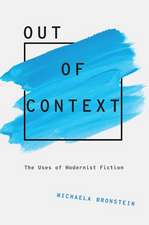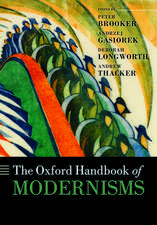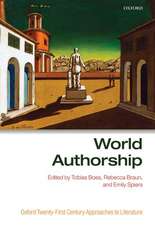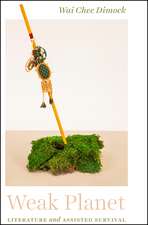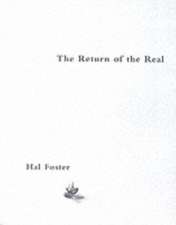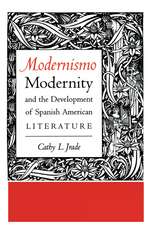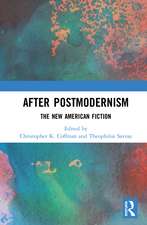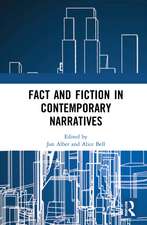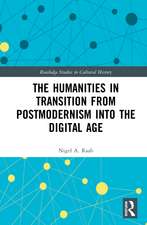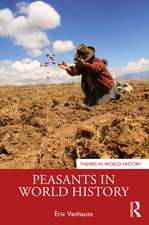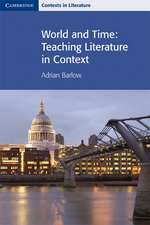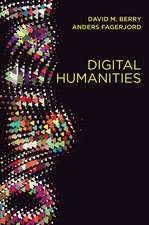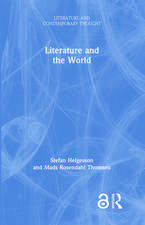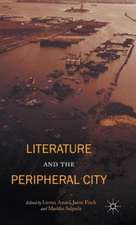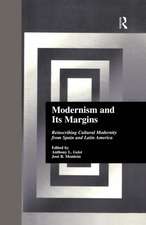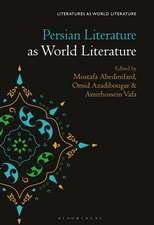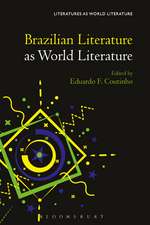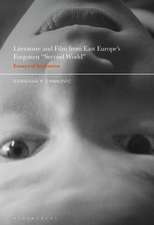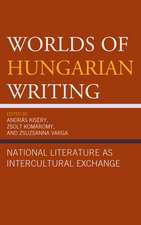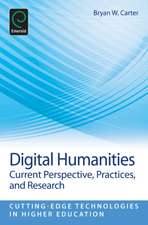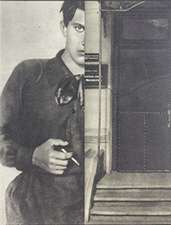Dutch and Flemish Literature as World Literature: Literatures as World Literature
Editat de Professor Theo D'haenen Limba Engleză Hardback – 24 iul 2019
| Toate formatele și edițiile | Preț | Express |
|---|---|---|
| Paperback (1) | 219.84 lei 6-8 săpt. | |
| Bloomsbury Publishing – 27 ian 2021 | 219.84 lei 6-8 săpt. | |
| Hardback (1) | 570.42 lei 3 zile | |
| Bloomsbury Publishing – 24 iul 2019 | 570.42 lei 3 zile |
Din seria Literatures as World Literature
- 20%
 Preț: 219.84 lei
Preț: 219.84 lei - 23%
 Preț: 191.13 lei
Preț: 191.13 lei - 28%
 Preț: 466.39 lei
Preț: 466.39 lei - 23%
 Preț: 191.92 lei
Preț: 191.92 lei - 23%
 Preț: 192.19 lei
Preț: 192.19 lei - 22%
 Preț: 251.65 lei
Preț: 251.65 lei - 22%
 Preț: 236.92 lei
Preț: 236.92 lei - 24%
 Preț: 190.33 lei
Preț: 190.33 lei - 23%
 Preț: 197.14 lei
Preț: 197.14 lei - 23%
 Preț: 193.18 lei
Preț: 193.18 lei - 23%
 Preț: 191.67 lei
Preț: 191.67 lei - 23%
 Preț: 199.20 lei
Preț: 199.20 lei - 23%
 Preț: 199.37 lei
Preț: 199.37 lei - 30%
 Preț: 776.32 lei
Preț: 776.32 lei - 23%
 Preț: 190.87 lei
Preț: 190.87 lei - 23%
 Preț: 192.64 lei
Preț: 192.64 lei - 22%
 Preț: 833.47 lei
Preț: 833.47 lei - 23%
 Preț: 193.36 lei
Preț: 193.36 lei - 30%
 Preț: 718.19 lei
Preț: 718.19 lei - 21%
 Preț: 217.27 lei
Preț: 217.27 lei - 23%
 Preț: 192.01 lei
Preț: 192.01 lei - 22%
 Preț: 231.81 lei
Preț: 231.81 lei - 23%
 Preț: 198.12 lei
Preț: 198.12 lei - 13%
 Preț: 256.59 lei
Preț: 256.59 lei - 23%
 Preț: 197.42 lei
Preț: 197.42 lei - 22%
 Preț: 238.49 lei
Preț: 238.49 lei -
 Preț: 239.14 lei
Preț: 239.14 lei - 30%
 Preț: 539.49 lei
Preț: 539.49 lei - 30%
 Preț: 540.38 lei
Preț: 540.38 lei
Preț: 570.42 lei
Preț vechi: 663.29 lei
-14% Nou
Puncte Express: 856
Preț estimativ în valută:
109.15€ • 114.27$ • 90.31£
109.15€ • 114.27$ • 90.31£
Carte în stoc
Livrare din stoc 25 februarie
Preluare comenzi: 021 569.72.76
Specificații
ISBN-13: 9781501340123
ISBN-10: 1501340123
Pagini: 344
Dimensiuni: 152 x 229 x 21 mm
Greutate: 0.59 kg
Editura: Bloomsbury Publishing
Colecția Bloomsbury Academic
Seria Literatures as World Literature
Locul publicării:New York, United States
ISBN-10: 1501340123
Pagini: 344
Dimensiuni: 152 x 229 x 21 mm
Greutate: 0.59 kg
Editura: Bloomsbury Publishing
Colecția Bloomsbury Academic
Seria Literatures as World Literature
Locul publicării:New York, United States
Caracteristici
Raises awareness of "national" literatures as part of a much wider literary field comprising both neighboring and distant other literatures, and how the resulting interplay of literatures constitutes "world literature"
Notă biografică
Theo D'haen is Professor of English and American Literatures, KU Leuven, Belgium. He is the author or editor of 53 books, including The Routledge Concise History of World Literature (2012), American Literature: A History (with Hans Bertens, 2014), World Literature: A Reader (edited with César Domínguez and Mads Rosendahl, 2013), A World History of Literature (2012), The Routledge Companion to World Literature (edited with David Damrosch and Djelal Kadir, 2012), and Crime Fiction as World Literature (edited with David Damrosch and Louise Nilsson, Bloomsbury, 2017).
Cuprins
Introduction: Dutch and Flemish Literature as World LiteratureTheo D'haen (KU Leuven, Belgium)1. A king and two foxes: Middle Dutch Literature on European CrossroadsGeert Claassens (KU Leuven, Belgium)2. John of Ruusbroec (1293-1381), Celebrated Mystagogical Author of The Spiritual Espousals Kees Schepers (University of Antwerp, Belgium)3. Die Rose by Heinric of Brussels, the Brabantine Version of the Old French Romance of the RoseAnne Reynders (KU Leuven, Belgium) 4. Courtly Literature in the Low Countries and Germany: Jacob van Maerlant and Rudolf von Ems Bart Besamusca (University of Utrecht, Netherlands)5. The Many Returns of Elckerlijc: Every Man's Mirror of Salvation Geert Warnar (University of Leiden, Netherlands)6. Joost van den Vondel (Cologne 1586 - Amsterdam 1679) as Writer/Translator: Literacy in Transit Marco Prandoni (University of Bologna, Italy)7. Multatuli: His Work Through the World Jaap Grave (University of Münster, Germany)8. How a Flemish Writer Turned Global: The 19th-Century Journey of Conscience's Early NovellasLieven D'hulst (KU Leuven, Belgium)9. Couperus in TranslationRuud Veen (Independent Scholar)10. Dutch Literature and the Global System of Indentured Labor, 1900-1940 Saskia Pieterse (University of Utrecht, Netherlands) 11. Towards a History of Russian Translations of Dutch Literature: Herman Heijermans and His Play The Good Hope in Russia Irina Michajlova (Saint Petersburg State University, Russia) and Sergei Tcherkasski (Russian State Institute of Performing Arts / Saint Petersburg Theatre Arts Academy, Russia)12. Rescuing Something Fine: Huizinga's Herfsttij der Middeleeuwen (The Waning of the Middle Ages) as World LiteratureElke Brems (KU Leuven, Belgium) & Orsolya Réthelyi (Eötvös Loránd University of Budapest, Hungary)13. "Glimpses of a poetic genius": Paul van Ostaijen (1896-1928) and World LiteratureGeert Buelens (University of Utrecht, Netherlands)14. Dutch Interbellum Poetry and/as World Literature Theo D'haen (KU Leuven, Belgium)15. Reinventing the Modernist Novel: Louis Paul Boon and Hugo ClausKris Humbeeck (University of Antwerp, Belgium)16. Small Amsterdam and the World Beyond: The Case of the Magazine BarbarberBart Vervaeck (KU Leuven, Belgium) and Dirk De Geest (KU Leuven, Belgium)17. Postwar Dutch FictionHans Bertens (University of Utrecht, Netherlands)18. Expansions Without Affect; Identities Without Globality: Global Novels in Dutch From an Agonistic PerspectiveHans Demeyer (University College London, UK)19. Orpheus in the Trenches: Modes of Translation in Stefan Hertmans' War and Turpentine Frank Albers (University of Antwerp, Belgium)20. At the Edge of the World and Other Stories: Dutch-Australian Emigration Literature, ca. 1945-1990Ton van Kalmthout (Huygens Institute, Royal Dutch Academy of Sciences, Netherlands)Index
Recenzii
This compendious collection opens out the varied landscape of literature in Dutch from the Middle Ages to the present, with illuminating essays on writers who were at once hemmed in by the surrounding major powers and deeply engaged with them. Anyone interested in world literature, in centre-periphery relations and in translation studies will find many discoveries among these writers who together created a minor literature of major proportions.
This useful book offers new perspectives on the relationship between Dutch writing and other literatures through the ages. The contributors make a strong case for redefining the position of Dutch as a world literature, opening the way for other unjustly neglected literatures to be re-evaluated.
For non-Dutch readers, this collection of essays presents a marvellous discovery of the gems of Dutch or Flemish literature, their rich colours and brilliance, and their significance as world literature. This shows what world literature can do at its best - namely, the enrichment of world literature by bringing in the best of the world's various literary traditions, particularly those globally yet-unknown works of great worth and value for our understanding and appreciation.
This useful book offers new perspectives on the relationship between Dutch writing and other literatures through the ages. The contributors make a strong case for redefining the position of Dutch as a world literature, opening the way for other unjustly neglected literatures to be re-evaluated.
For non-Dutch readers, this collection of essays presents a marvellous discovery of the gems of Dutch or Flemish literature, their rich colours and brilliance, and their significance as world literature. This shows what world literature can do at its best - namely, the enrichment of world literature by bringing in the best of the world's various literary traditions, particularly those globally yet-unknown works of great worth and value for our understanding and appreciation.

